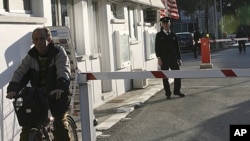1914 -- Cyprus annexed by Britain, after more than 300 years of Ottoman rule.
1925 -- Becomes British colony.
1955 -- Greek Cypriots begin guerrilla war against British rule in pursuit of unification with Greece.
1960 -- Britain grants independence to Cyprus under a power-sharing constitution between Turkish and Greek Cypriots.
1963-64 -- Power-sharing crumbles amid fighting; government formed without Turkish Cypriots and recognized worldwide as only legitimate authority on island. United Nations peacekeeping force set up.
1974 -- Military junta in Greece backs July coup against President Archbishop Makarios. Five days later Turkish troops invade Cyprus.
Turkey and Greece come close to war. The coup quickly collapses, as does the Athens junta. Turkish forces occupy the northern third of the island.
The U.N. Security Council unanimously passes a resolution calling on Turkey to withdraw its troops from Cyprus. Turkey refuses to do so.
1980 -- U.N.-sponsored peace talks resume.
1983 -- Turkish Cypriot leader Rauf Denktash declares a breakaway state in northern Cyprus. Only Turkey recognizes it.
1996 -- Two Greek Cypriots are killed in separate demonstrations along the U.N.-controlled cease-fire line in the worst outbreak of violence since 1974.
2002 -- U.N. presents a peace plan for Cyprus calling for broad power-sharing and a return of territory to Greek Cypriots.
2003 -- Turkish Cypriot side authorizes opening checkpoints along the cease-fire line for day trips.
2004 -- Cyprus is one of 10 new states to join the European Union, but does so as a divided island.
2006 -- U.N.-sponsored talks between President Tassos Papadopolous and Turkish Cypriot leader Mehmet Ali Talat agree to a series of confidence-building measures and contacts between the two communities.
2008 -- Communist party leader Demetris Christofias wins Cyprus' presidential election and agrees to immediately revive reunification efforts.
Greek and Turkish Cypriots demolish barriers dividing the old city of Nicosia.
Christofias and Talat agree to enter direct peace negotiations.
2012 -- The U.N. cancels plans for a Cyprus conference, citing lack of progress on any of the substantial differences between the two sides.
2014 -- Cyprus suspends peace talks with Turkish-held Cypriots in protest against what it calls efforts by Turkey to prevent it from exploring gas fields south of the island. The EU and U.S. express concern over the tension.
2015 -- Government and Turkish Cypriot negotiators resume talks on reunification, holding 20 rounds of U.N.-sponsored talks in the course of the year.
2016 -- President Nicos Anastasiades and Turkish Cypriot leader Mustafa Akinci make unprecedented joint New Year television address ahead of continuing round of reunification talks.
2017 -- Greek and Turkish Cypriot leaders meet at U.N. in Geneva for direct talks on reunification under a federal arrangement.










